US intelligence confirms Iran’s president injured in Israeli strike - CBS
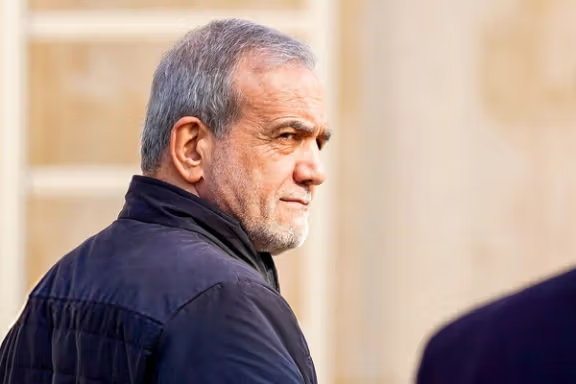
Iranian President Masoud Pezeshkian was injured during an Israeli airstrike last month, two US intelligence sources told CBS News, confirming reports from Iranian state media.

Iranian President Masoud Pezeshkian was injured during an Israeli airstrike last month, two US intelligence sources told CBS News, confirming reports from Iranian state media.
The sources said Pezeshkian was attending a Supreme National Security Council meeting when the strike occurred and confirmed that Iranian state media reports about the incident were accurate. According to those reports, he was hurt while escaping through an emergency shaft. CBS said it remains unclear whether he was deliberately targeted.
IRGC-linked Fars News Agency said the June 16 strike hit a building in Tehran’s Shahrak-e Bagheri district during a high-level meeting attended by Pezeshkian, parliament speaker Mohammad Bagher Ghalibaf and judiciary chief Mohseni Ejei.
The outlet said six precision-guided munitions targeted entry and exit points, cutting power and forcing officials to flee through a prepared emergency hatch. It said Pezeshkian and others suffered minor leg injuries.
The report said the attack resembled an earlier Israeli assassination attempt on Hezbollah leader Hassan Nasrallah. Authorities are investigating whether intelligence used in the strike came from an insider, according to Fars.
Pezeshkian previously told US commentator Tucker Carlson that Israel attempted to assassinate him during the meeting. “They did try, yes… but they failed,” he said.
The 12-day conflict between Israel and Iran killed hundreds in Iran and 28 people in Israel. Among those killed were Gen. Hossein Salami, commander of the Revolutionary Guard, and Gen. Amir Ali Hajizadeh, head of its missile program. The US also carried out strikes on Iranian nuclear sites during the fighting.
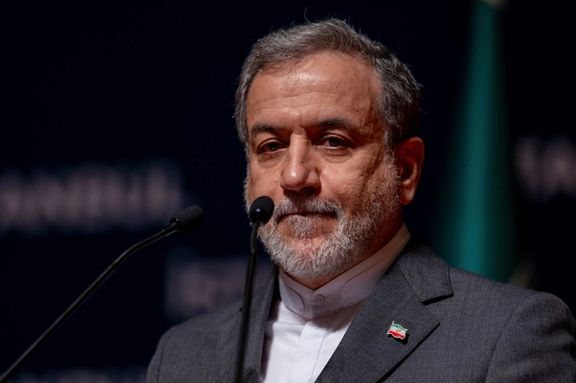
Any new nuclear deal must meet what Iran describes as fair and balanced terms, Foreign Minister Abbas Araghchi said Friday, after a call with European ministers who urged Tehran to return to talks before the end of August or face the possible return of UN sanctions.
“It was the US that withdrew from a two-year negotiated deal, coordinated by the EU in 2015, not Iran,” Araghchi wrote on X after a joint teleconference with the foreign ministers of France, Britain, Germany, and the EU’s top diplomat. “And it was the US that left the negotiation table in June this year and chose a military option instead, not Iran.”
“Any new round of talks is only possible when the other side is ready for a fair, balanced, and mutually beneficial nuclear deal,” he added.
Araghchi warned the EU and E3 powers to abandon “worn-out policies of threat and pressure,” referring specifically to the “snapback” mechanism, which he said they have “absolutely no moral and legal ground” to invoke.
EU urges immediate return to talks
A day earlier, a French diplomatic source said European ministers had pressed Araghchi to return to negotiations “immediately” during the same call. They also warned that if Iran does not make concrete progress toward a deal by the end of August, France, Britain and Germany would trigger the snapback mechanism, reimposing all UN sanctions.
The snapback, created under UN Security Council Resolution 2231, lets any party to the 2015 nuclear deal restore UN sanctions if Iran is found non-compliant. If no resolution is passed within 30 days to extend sanctions relief, all previous measures return automatically.
Tehran accuses US of using diplomacy as cover for war
Iranian state media reported Thursday that senior officials believe Washington is using diplomatic overtures to buy time for military preparations. “Our intelligence indicates Washington seeks talks to prepare for war, not peace,” an unnamed Iranian official told Press TV. The official also accused the US of trying to weaken Iran in advance of a broader regional conflict and said new talks would require firm guarantees.
US says Trump remains open to diplomacy
Despite last month’s joint US-Israeli strikes on Iran’s nuclear sites, the Trump administration says it expects Iran to resume talks. “He has believed and continues to believe that diplomacy will work here,” State Department spokeswoman Tammy Bruce said Thursday. “They should be very grateful that President Trump is as generous of a man as he is.”
Still, US officials acknowledge there is currently “no prospect” for a quick return to negotiations, according to a senior official cited by journalist Laura Rozen.
Hardening Iranian position
Iran’s parliament and senior diplomats have said new talks cannot begin without clear preconditions, including guarantees against further military action. Araghchi and others have also demanded that any future agreement address issues such as Israel’s nuclear arsenal and accountability for the recent war.
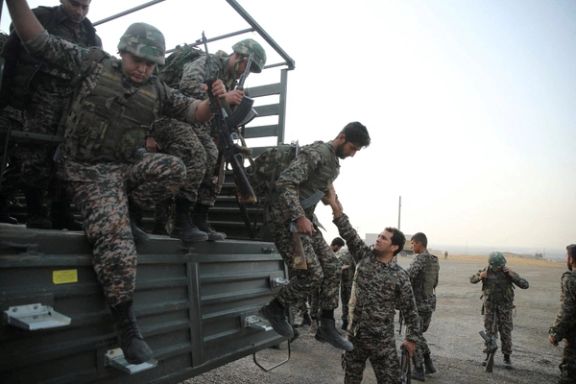
Belgium’s parliament passed a resolution early Friday backing efforts to designate the Revolutionary Guards (IRGC) as a terrorist organization on the EU list, with lawmaker Darya Safai calling the move a strong political signal.
Safai, who led the years-long push, said the resolution was approved at 2:30 a.m. with 135 votes in favor, 14 abstentions, and none opposed. “Today is the day that justice will be served, a day that the victims of this regime will always remember as a victory against their murderers,” she wrote on X.
"My resolution to designate the Islamic Revolutionary Guard Corps (IRGC) of the Iranian regime as a terrorist organization was approved today in the Belgian Parliament," Safai added.
She said the resolution not only calls for the EU to designate the IRGC but also urges “the unconditional and immediate release of Ahmadreza Djalali” and an end to executions by Iranian authorities. Djalali, a Swedish-Iranian academic arrested in Iran in 2016, was sentenced to death on espionage charges, which he denies.
Safai described the IRGC as “a murder machine that not only wages war against the Iranian people in Iran, but also spreads terror and murder throughout the region through its proxies.” In an earlier post, she said the IRGC is involved in terrorism, arms trafficking, and support for groups such as Hezbollah, Hamas and the Houthis, and accused it of fueling conflicts in Iraq, Syria, Libya, Afghanistan, and Ukraine.
Safai’s proposal was backed earlier this month by the Belgian parliament’s foreign affairs committee. It had previously received political support from then-Foreign Minister Hadja Lahbib.
The new Belgian government, led by Bart De Wever, reaffirmed that position in its coalition agreement, which said "The government advocates for the inclusion of the Iranian Islamic Revolutionary Guard Corps on the European Union's list of terrorist organizations."
The IRGC, a powerful branch of Iran’s armed forces, was designated a terrorist organization by the United States in 2019 under President Donald Trump. The US and Canada have urged their European allies to follow suit.
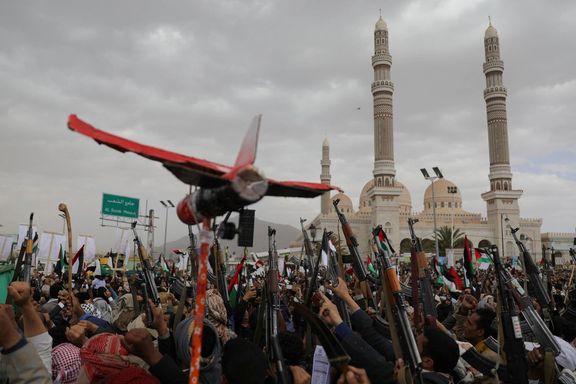
Iran on Thursday denied sending weapons to Yemen’s Houthis a day after the US military said Yemeni forces made the largest-ever seizure of conventional Iranian arms bound for the Tehran-backed group.
Foreign ministry spokesman Esmail Baqaei on Thursday called the claim "baseless and part of a media campaign against Iran.”
Yemeni forces fighting the Iran-backed Houthi movement have carried out their largest ever seizure of advanced Iranian conventional weapons bound for the group, US Central Command (CENTCOM) said on Wednesday.
CENTCOM said the National Resistance Forces (NRF) confiscated over 750 tons of advanced weaponry including anti-ship and anti-aircraft missiles, warheads, hundreds of drone engines, air defense equipment, radar systems and communications equipment.
The NRF is an anti-Houthi force led by General Tareq Saleh, nephew of Yemen’s former President Ali Abdullah Saleh, and operates independently of the internationally recognized government.
CENTCOM added that many of the systems were manufactured by a company affiliated with Iran’s defense ministry and included manuals in Farsi.
“We commend the legitimate government forces of Yemen who continue to interdict the flow of Iranian munitions bound for the Houthis," General Michael Erik Kurilla, commander of CENTCOM said in a statement.
"The interdiction of this massive Iranian shipment shows that Iran remains the most destabilizing actor in the region. Limiting the free flow of Iranian support to the Houthis is critic to regional security, stability, and freedom of navigation,” he added.
Since the outbreak of the Gaza war, Yemen’s Houthis have launched missiles, rockets, and drones toward Israel and enforced a maritime disruption in the Red Sea, in what it describes as support for Palestinians in Gaza.
Last month, the group's rivals in Yemeni government said that Iran is transferring parts of its military industry, including ballistic missile and drone production to Houthi-controlled areas in Saada, Hajjah, and the outskirts of Sanaa.
The Houthis resumed attacks on the high seas following a June 24 ceasefire ending a 12-day war between Israel and Iran.
Houthi forces sank a Liberian-flagged carrier on July 6 with rockets and explosive drone boats. The group, which controls most of Yemen's population centers, says its maritime attacks are in solidarity with Palestinians in Gaza.
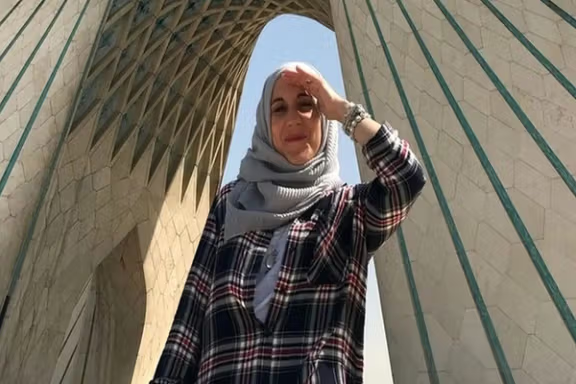
The curious case of Catherine Perez-Shakdam, a French-born Jewish woman who years ago met senior Iranian officials posing a sympathizer, has been revived in Tehran following a punishing war with Israel.
Iran is smarting from intelligence lapses in the 12-day war which allowed its arch-foe to assassinate top military figures and wreak havoc on bases and nuclear sites.
Hundreds of civilians were killed in the shock campaign last month.
The scale of the setback has sent bewildered officialdom searching for answers, and one Iranian lawmaker cited Shakdam's presence as a case study in infiltration.
Presenting herself as a Muslim convert and writer critical of Israel and the United States, Shakdam interviewed senior Iranian officials as a freelance journalist and attended various state-backed conferences on multiple visits up until 2017.
Iranian MP Mostafa Kavakebian said in a state TV interview last week that Shakdam was an Israeli spy who had slept with 120 senior officials, citing no evidence.
Speaking to Iran International, Shakdam was blunt about the remarks: “Not true, not possible, and completely absurd."
"They’re trying to destroy my character. I’ve got news for them — I do not give a shit. And you can quote me on this.”
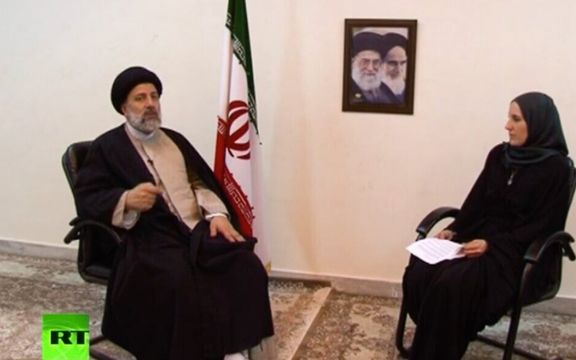
Kavakebian's allegation drew fire online, where critics cited it as an example of poor logic, and even Iranian legal authorities who appeared eager to swiftly scotch discussion of the country's security failures.
Tehran’s prosecutor filed charges against Kavakebian for “disturbing public opinion,” calling the claims “unsupported" and summoned him to provide evidence.
State media outlet the West Asia News Agency (WANA), said the state had found no sign of espionage in Shakdam's case.
"Iran’s security and judicial bodies have explicitly stated that no documents or reports exist indicating immoral behavior, suspicious connections or illegal activities by Shakdam during her time in Iran."
Double life
Shakdam now works as a political analyst and spokesperson for an Israeli advocacy group We Believe In Israel.
She first drew the attention of Iranian authorities after publishing an opinion piece in the English-language Yemen Observer newspaper criticizing US intervention in Iraq. In 2009, she had moved to Yemen after marrying a Yemeni man.
The couple had two children before later divorcing. Her writings and public commentary eventually led to an invitation to appear on Iranian state TV as a Western voice critical of US foreign policy — a platform that opened the door to extraordinary access within Iran’s political elite.
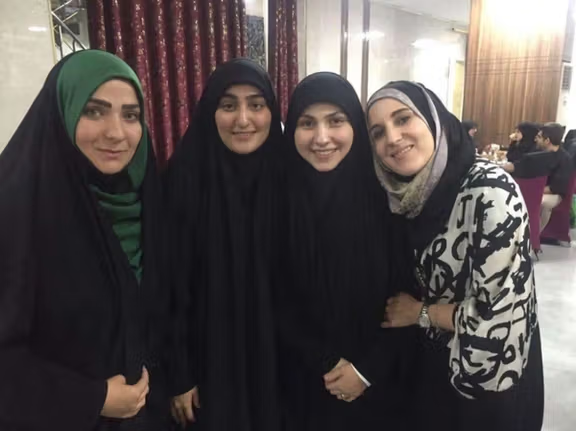
That access, she says, revealed a system obsessed with propaganda and deeply rooted anti-Semitism.
“If you want to call me a master spy — yes, of my own agency, okay?” she told Iran International. “I went there on my own two feet. No one asked me to do anything.”
Her mission, she says, was self-assigned — but it came at a steep personal cost.
“Ten years of hard work, ten years of pretending and playing the game, and ten years of almost losing myself — because you reach a point where you don't know where you begin and the lie ends.”
During her time in Iran, she says she met top figures including Ebrahim Raisi before he became president and later died in a helicopter crash, Revolutionary Guards Quds Force commander Qasem Soleimani and even Supreme Leader Ali Khamenei.
With dark humor, she recalled: “I had a little chat with Soleimani — obviously before he died because I don’t speak to ghosts. Raisi, obviously … Nader Talebzadeh many times. He died too. Not of my doing, okay. I had nothing to do with that.”
She joked that if she were a spy, she must be “00 Fluffy” — her own spin on 007, due to her owning many pet cats.

Warnings
The humiliation of Iran's military losses appears to be playing out in Iran's seemingly permanent power struggle between reformists and hardliners.
WANA characterized MP Kavakebian's TV outburst as an attempt to undermine hardliners who had welcomed Shakdam into their midst after foreign attacks last month failed to deliver the upheaval moderates supposedly seek in Iran.
"The lack of Iranian public support for Israel’s attack—even among those critical of the ruling system and governance quality in Iran—and the refusal to participate in street unrest, went against the expectations of pro-Western reformists inside the country."
"Perhaps the 'Mossad spy' story in Iran is not a bad place to start attacking a rival," WANA added. "Still, it must not be forgotten that the biggest beneficiaries of any internal division in Iran are those sitting in Tel Aviv."
Shakdam believes she was targeted because she is more visible and critical of Iran than ever following the 12-day war. Shakdam says the attack is rooted in the Islamic Republic’s deep-seated sexism and aimed at silencing outspoken women.
But after a decade of deception and backlash, she says she has no regrets.
“I just made a decision to do something with my life. And I did it. And I came out. And I’m proud of it.”
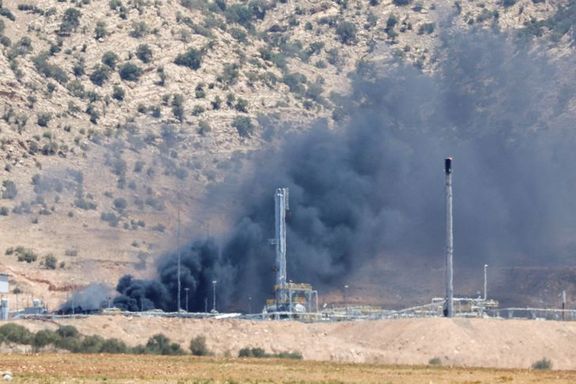
A Norwegian-operated oil field in Iraqi Kurdistan was hit by a drone strike on Thursday, in the second attack in as many days which local officials cited by Reuters blamed on Iran-backed groups.
The attack targeted a DNO-operated oil field in Tawke, located in the Zakho area. A day earlier, the US-based Hunt Oil facility at the Ain Sifni oilfield in the Dohuk region was also attacked.
No group has claimed responsibility, but local officials cited by Reuters blamed Iran-backed Iraqi militias.
No casualties were reported in either incident but the attacks dented oil production by 140,000 to 150,000 barrels per day (bpd) according to two energy officials cited by the news agency. The region’s total oil output is reportedly around 280,000 bpd.
On July 13, Iraqi media reported that the United States warned Iraq it could face sanctions over alleged Iranian oil smuggling and ties to armed groups, including threats to freeze millions in revenue and target the state oil firm SOMO.
The United States opposes the presence of Iranian-backed armed groups in Iraq's security apparatus.
These militias, including Kata'ib Hezbollah and Asa'ib Ahl al-Haq, are part of the Popular Mobilization Forces (PMF) grouping which joined forces with the Iraqi military to confront Islamic State militants in Iraq.
Washington accuses them of receiving support from the Revolutionary Guard Corps-Quds Force to attack US personnel in Iraq.
Iran's armed allies in the region have been dealt heavy blows as a region-wide conflict between Israel and Iran has seethed.
The armed Houthi group in Yemen resumed attacks on the high seas following a June 24 ceasefire ending a 12-day war between Israel and Iran.
Houthi forces sank a Liberian-flagged carrier on July 6 with rockets and explosive drone boats. The group, which controls most of Yemen's population centers, says its maritime attacks are in solidarity with Palestinians in Gaza.
Yemeni forces fighting the Houthis carried out their largest ever seizure of advanced Iranian conventional weapons bound for the group, US Central Command (CENTCOM) said on Wednesday.